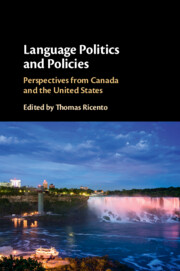Book contents
- Language Politics and Policies
- Language Politics and Policies
- Copyright page
- Dedication
- Contents
- Figures
- Tables
- Contributors
- Preface
- Contributor Personal Statements
- Introduction
- Part I Theoretical Orientations
- Part II The United States Context
- Part III The Canadian Context
- 11 Heritage Language Education Policies and the Regulation of Racial and Linguistic Difference in Ontario
- 12 A Foucauldian Approach to Language Policy in Canada
- 13 Promises, Acts, and Action
- 14 Language, Land, and Stewardship
- 15 A Land of Immigration and Official French–English Bilingualism
- 16 Ethnocultural and Linguistic Diversity
- Index
- References
12 - A Foucauldian Approach to Language Policy in Canada
from Part III - The Canadian Context
Published online by Cambridge University Press: 18 July 2019
- Language Politics and Policies
- Language Politics and Policies
- Copyright page
- Dedication
- Contents
- Figures
- Tables
- Contributors
- Preface
- Contributor Personal Statements
- Introduction
- Part I Theoretical Orientations
- Part II The United States Context
- Part III The Canadian Context
- 11 Heritage Language Education Policies and the Regulation of Racial and Linguistic Difference in Ontario
- 12 A Foucauldian Approach to Language Policy in Canada
- 13 Promises, Acts, and Action
- 14 Language, Land, and Stewardship
- 15 A Land of Immigration and Official French–English Bilingualism
- 16 Ethnocultural and Linguistic Diversity
- Index
- References
Summary
This article examines developments in the field of policy studies in order to consider their applicability for the study of language policy and planning. In particular, Foucauldian insights into power and discourse offer the possibility of elaborating on descriptive language policy studies and force a reconsideration of the premise upon which policymaking is often based: the starting point of the “problem” for which a policy solution is needed. By analyzing the proceedings of the Royal Commission on Bilingualism and Biculturalism (1963-70) in order to trace the development of Canada’s Official Languages Act (1969), this paper advocates for a broader set of theoretical and methodological approaches to our work as scholars in the field of language policy.
- Type
- Chapter
- Information
- Language Politics and PoliciesPerspectives from Canada and the United States, pp. 232 - 243Publisher: Cambridge University PressPrint publication year: 2019



